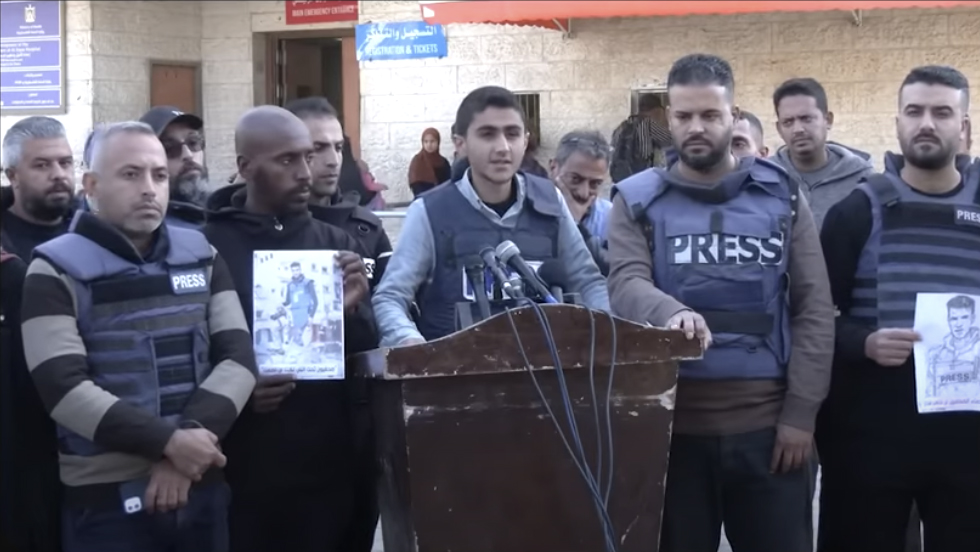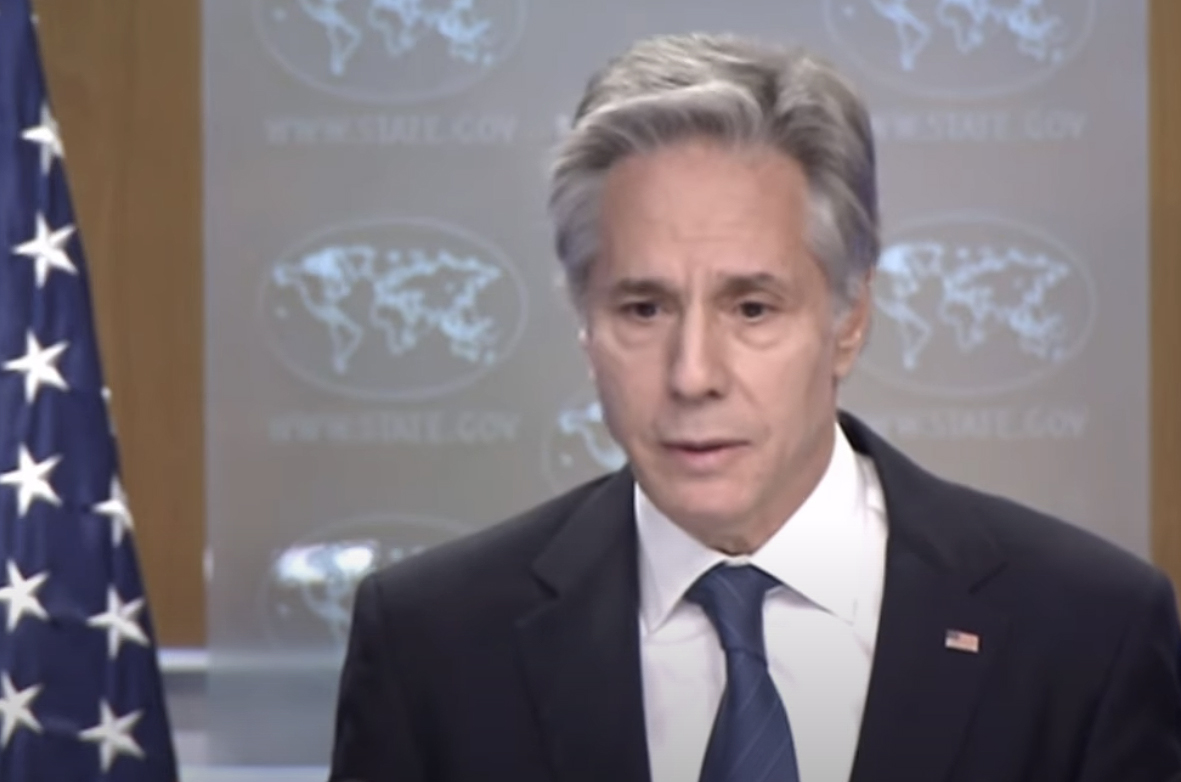In the midst of ongoing and devastating violence in Gaza, a 22-year-old Palestinian journalist, Abubaker Abed, delivered a harrowing press conference that has since reverberated around the world. Abed, from Deir Al Balah in Gaza, has risked his life every day to document the destruction and suffering of his people. Now, in a speech addressed directly to Western media, he offers a grim but urgent plea for truth, solidarity, and accountability.
Below is Abubaker Abed’s speech in its entirety, as presented during a press conference…
“These are not my words, but the words of every single one here, standing here after 459 days of the most well documented and first livestream genocide in history. For these days we’ve been reporting tirelessly, extensively, and thoroughly on this genocide.
It’s indeed a genocide against us, which we’ve been documenting in makeshift tented camps and workplaces. They are really the places we’ve taken shelter, as shelter since day one. You’ve seen us shedding tears over our loved ones, colleagues, friends, and family members. You’ve seen us killed in every possible way. We’ve been immolated, incinerated, dismembered, and disembowelled, and recently we’ve been frozen to death.
What more ways should you be seeing us killed so that you can move and act and stop the hell inflicted upon us? There are no words to describe what we’ve been going through, because you’ve seen our bodies—how they’ve become fragile, skinny, and emaciated. But we never stopped. We never stopped telling you the truth, to narrate our stories and to tell you that we are being genocided. To move your dead consciences. To help a population that has seen every sort of torture and tasted every type of death.
Today we’re all standing here after Israel’s impunity against us, and we don’t know how many journalists should be killed so you can really act and stop Israel’s impunity against us. Our message is very clear: we are journalists, and we are Palestinian journalists. We have been let down by the international community, particularly the international media organizations. We haven’t seen any sort of support—not a single word of support.
Even the ‘Press’ vest we’re wearing right now marks us as a target; they do not protect us at all. But yes, because we are Palestinians—maybe if we were Ukrainians or of any other citizenship with blonde hair and blue eyes, the world would rage and rant for us. But because we are Palestinians, we have only one right, which is to die and be named.
Finally, we are just documenting a genocide against us. It’s enough. After almost a year and a half, we want you to stand shoulder to shoulder with us, because we are like any other journalists, reporters, and media workers all across the globe, no matter the origin, the color, or the race. Journalism is not a crime. We are not a target.”
Abed’s impassioned plea emerges after what many human rights organizations and independent observers have described as continuous bombardment in Gaza. Palestinian journalists, in particular, have found themselves on the front lines—not only reporting atrocities but frequently becoming victims themselves.
During the same press conference, activists and journalists emphasized the following concerns:
– Lack of Western Media Coverage: Abed’s speech underscores a sense of betrayal by major Western outlets, which he accuses of failing to recognize or highlight the “explicitly and repeatedly stated genocidal intent” of Israeli officials.
– Fear and Censorship: Many journalists, including those based in the West, have reportedly been reluctant to speak openly against alleged war crimes or the broader humanitarian crisis for fear of career ramifications or accusations of bias.
– Legal and Moral Accountability: Activists demand that Western governments and media be held accountable for what they term “facilitating” or “normalizing” actions they describe as genocide. They argue that if Western outlets had adequately showcased the scale of destruction, the public pressure might have forced governments to intervene earlier.
– Solidarity Among Journalists: Citing the high death toll among Palestinian media workers, Abed and others call on international journalist unions and media organizations to offer more direct support—ranging from protective equipment to formal condemnations of violence against press members.
In a broader context, critics of the Western media’s response point to the stark difference in coverage standards for conflicts involving Western nations or European populations compared with those involving the Middle East. Numerous commentators argue that the disproportionate emphasis on official Israeli government narratives, combined with what they see as insufficient humanization of Palestinian victims, perpetuates misinformation and fuels a cycle of violence.
The speech has sparked debate among journalists worldwide. Some prominent Western reporters and editors have taken to social media to voice their concerns and regrets, acknowledging that more comprehensive coverage was necessary. Others, however, maintain that editorial guidelines and limited access have hampered in-depth reporting from within Gaza.
Meanwhile, dozens of organizations dedicated to press freedom have urged the international community to investigate alleged war crimes against journalists. They stress that media workers must be protected under international law, regardless of their nationality, ethnicity, or the conflict zone in which they operate.
Abubaker Abed’s words are a searing reminder of the personal cost borne by those who dedicate themselves to telling stories from within Gaza—accounts of suffering, loss, and survival—so the rest of the world might pay attention. Whether Abed’s speech leads to meaningful change or deeper introspection in Western coverage remains to be seen, but it has undeniably left an indelible mark on the global conversation about truth, journalistic integrity, and the human toll of war.
Abed’s press conference was not merely a condemnation; it was a call to action—an impassioned appeal for empathy, transparency, and a refusal to stand idly by while journalists and civilians face what he terms a “genocide.” If anything, his message stands as a challenge to media organizations and governments across the globe: to investigate, to shine a light, and to hold power to account, regardless of the risks or pressures that may arise in doing so.
At least 217 journalists and media workers have been murdered by the Israel Defence Force (IDF) in Gaza, since October 2023, against all international law.
Around 50,000 people – mainly women and children – have been recorded by officials in Gaza as having been killed by Israel during its indiscriminate bombing campaign of the beseiged Gaza strip, and new estimates suggest this figure may be acutely innaccurate.
Last week, research published in the Lancet medical journal estimated that the death toll in Gaza during the first nine months of the Israel-Hamas war was about 40% higher than numbers recorded by the Palestinian territory’s health ministry.
Israel continues to disallow any and all international media from independently entering Gaza to enable verification and fact-checking of the reality on the ground.
*If you would like to support further independent journalism and awareness-raising efforts, please consider visiting Abed’s page, here: https://x.com/abubakerabedw or international press freedom groups like The Committee to Protect Journalists: https://cpj.org/ that work on documenting and preventing violence against journalists in conflict zones.*




